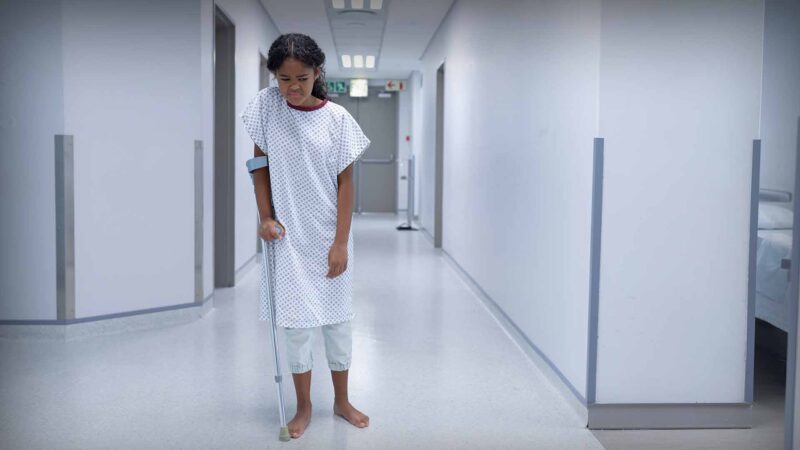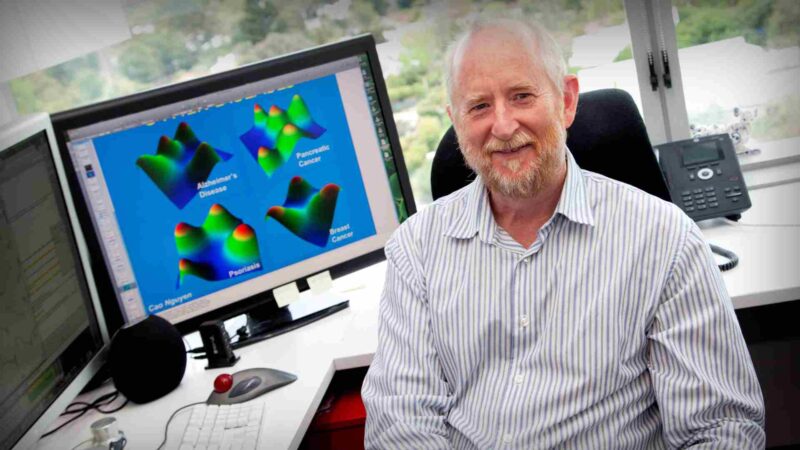RESEARCHER PROFILE
Dr Alex Cole (Filmed May 2024)
Research Officer
Centre for Biomedical AI,
Centenary Institute,
Sydney, Australia
Ovarian cancer, one of the deadliest cancers affecting women worldwide, is a challenging disease to treat. High rates of chemotherapy resistance hinder treatment success and patient survival.
Dr Alex Cole, from the Centenary Institute’s Centre for Biomedical AI, is now leading the research focused on developing a new treatment to counteract a protein called follistatin (FST), known for making ovarian cancer cells resistant to chemotherapy.
By employing cutting-edge molecular biology and directed evolution techniques, the project aims to create nanobodies—small, precise molecules—that can block FST. If successful, these nanobodies could enhance the effectiveness of chemotherapy and improve ovarian cancer treatment rates.
“We know that chemotherapy triggers increased FST production in the body, which aids cancer cells in resisting treatment,” said Dr Cole.
“Our nanobodies, derived from antibodies and engineered to target and neutralise FST, could potentially make cancer cells vulnerable to chemotherapy again.”
Dr Cole emphasised the critical importance of developing innovative therapies like FST nanobody therapy to improve patient outcomes.
“Chemotherapy is initially highly effective in treating ovarian cancer in women. However, in over 70% of cases the cancer will reoccur, often having developed resistance to chemotherapy, rendering it ineffective,” he said.
The grant, received through Cancer Australia’s Priority-driven Collaborative Cancer Research Scheme (PdCCRS) is co-funded by Cancer Australia and the Ovarian Cancer Research Foundation
Dr Cole received his PhD from the University of Sydney in 2017 (Kolling Institute) where he studied the role of epigenetic histone modifications on ovarian cancer. Alex continued his ovarian cancer research investigating the role of quiescence on cancer stem cells during Postdocs at the University of Michigan and the University of Pittsburgh. During this time, he received the Ann and Sol Schreiber Mentored Investigator Award from the Ovarian Cancer Research Fund Alliance, which led to the discovery that follistatin is secreted in response to chemotherapy where it actively promotes chemoresistance.
In 2020, he joined the Directed Evolution Lab at the Centenary Institute under Associate Professor Daniel Hesselson, where he worked to develop the novel viral directed evolution platform PROTEUS (Protein Evolution Using Selection). In 2023, Alex received a Tour de Cure grant which allowed for the validation of PROTEUS for nanobody evolution.
You Might also like
-
Neuroscience, neuropharmacology and exercise science
Dr Jacob Thorstensen is an early-career Assistant Professor in Neuroscience and Physiology in the Faculty of Health Sciences & Medicine at Bond University. He is also an honorary research fellow in The School of Biomedical Sciences at The University of Queensland. His work has unveiled several new neuroscientific mechanisms which have future applications for movement disorders.
-
Mental wellbeing in rural and regional communities dealing with environmental challenges
Associate Professor Suzie Cosh is a psychologist and clinical researcher. Her work focuses on the intersection of climate change and mental health and she currently leads a body of work that focuses on supporting small rural communities to recover from and prepare for extreme weather events such as bushfires, floods and droughts.
-
Systems genetics to determine risk of developing diabetes complications
Dr Mara Zeissig is a recently appointed Lab Head within the Tumour Inflammation and Immunotherapy Program at the South Australian immunoGENomics Cancer Institute (SAiGENCI).
Her research focuses on studying immune evasion mechanisms in lung and pancreatic cancers to identify novel ways to increase response to immunotherapy. Her expertise is in genetically engineered mouse models of lung cancer, CRISPR-Cas9 screening technologies and T cell based immunotherapies (e.g Checkpoint inhibitors).



